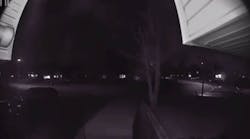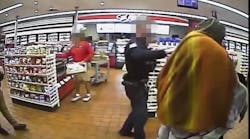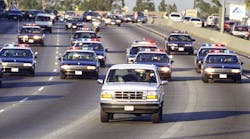Peace officers who work separate from traditional city and county forces are playing a significant role in Ohio law enforcement, providing what one police chief calls a "necessary" service.
Those officers, whose ranks are growing, are employed by organizations such as hospitals, colleges, airports and even a regional transit authority.
The Ohio Peace Officer Training Commission can certify 24 types of peace officers, who reach that distinction after finishing a minimum of 579 training hours and securing a position at an authorized agency.
Qualified peace officers can make arrests, write criminal citations, apply for warrants and carry guns.
As of last week, there were 33,603 peace officers in Ohio, including employees at the most well-known agencies: city police and county sheriff's offices. That is a 12 percent increase from 2009.
Many of those officers work for company - or area-specific police departments certified by the state. Municipalities also have the power to grant a "special peace officer" distinction to qualified officers who serve businesses such as banks, hospitals and amusement parks that don't have state-recognized police departments.
Officials and observers say that a variety of officers is necessary to patrol complex and crowded areas that would significantly strain city or county departments.
"It's not only helpful, it's necessary," said Richard Biehl, Dayton police chief, who began his career as an officer at the University of Cincinnati.
Officers can work for police departments at entities ranging from the Ohio Department of Taxation and the Ohio Department of Natural Resources, to port authorities and metropolitan housing authorities. The latest addition to the list is gaming agents for the state's casinos.
"We're not the bouncers," said Karen Huey, the Ohio Casino Control Commission director of enforcement. "We'll be working in a covert capacity and also have certain powers."
The number of private security officers in Ohio also has increased, from 21,420 in 2010 to 25,453 as of last week. Their requirements include passing a background check and an examination and paying a licensing fee. To carry guns, security officers must pass firearms training.
Some are concerned that the growing number of agencies and officers could make accountability difficult.
"If we're entrusting people to protect our community, we need to be sure they are able to do their jobs adequately," said Mike Brickner, spokesperson for ACLU of Ohio. "And if they're not, can we hold them accountable?"
State officials said their biggest concern is making sure officers are thoroughly trained under the same system. They can handle incidents like car break-ins and other minor incidents while aiding other agencies in more complicated investigations.
"Our job is to make sure when officers do get certified they are in the best position to serve the public safely and admirably," said Robert Fiatal, executive director of the Ohio Peace Officer Training Commission. "We constantly review curriculum as well as lesson plans to make sure we're doing that job."
Forming departments
The Ohio Department of Taxation first formed a tobacco enforcement unit with law enforcement powers in 1971. The taxation enforcement officials travel the state to confirm that tobacco taxes are handled properly; that sometimes involves entering unsafe areas or applying for search warrants. The department's officers also can provide enforcement assistance to other agencies that might not know as much about tax violations.
"Let's say you're a law enforcement officer driving down the road and a station wagon turns on a red light, and you pull him over," said Stan Dixon, an Ohio deputy tax commissioner in charge of the law enforcement division. "They might walk by the car and see it full of cartons of cigarettes. If you don't understand how Ohio laws for tobacco work, there's a good chance you hand him a citation and go back to your car and that's it. We're available to assist those kinds of issues, to know the specific laws."
The Greater Cleveland RTA formed a police department in the late 1970s and employs 134 officers with a budget of about $12 million. As the only regional transit authority in the state with a police department, the unit patrols the RTA's property, including its trains and buses.
A main benefit of an entity-specific department is the ability to mobilize quickly.
"I was talking to an agency in another city, and the response time (from city police) to an incident on their buses is very poor," said John P. Joyce, chief of the Greater Cleveland RTA police. "The police who would be responding are very busy."
Grandview Medical Center undertook the police department certification process three years ago; chief David Miller said it helps the department, which serves other properties in the Kettering Health Network system, recruit talented officers. Because it can now commission its own officers, the Grandview police can recruit directly from one of the Ohio Peace Officer Training Commission-certified programs or other departments, Miller said.
"I've been at this for 38 years, and the number one reason people give for why they do this is to help people," Miller said. "In this field, we get to live that every day, and we can do it in a lot of different places."
Plenty to patrol
Some of the entities that employ their own peace officers, such as park districts, hospitals and colleges, serve a number of visitors, which can create a variety of issues.
"The more crowded together they are, the more ornery they get," said Jim Campbell, executive director and chief ranger for the Clark County Park District.
Ohio law allows municipalities to form agreements with organizations including banks, hospitals and amusement parks that have not received state certification as police departments to employ OPOTC-trained personnel as special police officers. Julian Davis used to sign those agreements as the City of Day-ton's director of police. About three years ago, he joined Miami Valley Hospital as director of security and moved forward with a plan to increase the training and authority of its security staff.
Davis said the hospital formed an agreement with the city allowing his officers to be special police officers. He requires that they be OPOTC-trained and receive a commission from a state-recognized department.
"We have over 6,000 employees who work here, and we have a patient population that exceeds 500 more often than not," Davis said. "We have a lot of activity here. It's like a small township or city."
The same could be said for Kings Island, which has the ability to employ special police officers as an amusement park that exceeds an annual attendance of 600,000. It mixes special police officers with security guards to patrol its grounds.
"It certainly gives those folks the ability to take care of some of their own problems," said Ron Ferrell, the City of Mason police chief and former executive director of OPOTC. "Timeliness may be an issue, so it's helpful for everyone to have people with authority on site."
Continued attention
Sinclair Community College, one of the state's approved peace officer training academies, enrolls four classes per year with about 24 per class. Training coordinator Ellis Willis said he gets significant interest from military veterans, but not all want to undertake the hundreds of hours of training to become a peace officer.
"You can't do it without having that required training," Willis said. "It's necessary for all these fields."
Some are hoping to increase the training. OPOTC is undertaking a two-year review of its curriculum, which it expects to update by late 2013. Chiefs in the region say they have also seen more private security at work, and many in that industry would like to add training requirements.
"Other states have some basic training for security, things like public relations and for other issues," said Arnie J. Schropp, an Ohio Department of Public Safety deputy director in charge of the Private Investigator Security Guard Services, which licenses those jobs.
"Overall, we're looking at the possibility of a training course for security guards in order for them to become registered. Right now, we don't have that."
With a variety of options, peace officers can serve the public in a wide range of organizations. While some have concerns that there are too many overlapping agencies, others feel there is a benefit in having more trained officers on patrol.
"Some of our public officers are spread pretty thin," said Michael Norris, a Wright State associate sociology professor who teaches in the criminal justice program. "Consider how many officers we have and how much they have to cover with the population they have to serve. That's a lot to ask without some help."
Contact this reporter at 937-225-7389 or email [email protected]
Copyright 2012 Dayton Newspapers, Inc.



